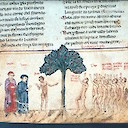Farai un vers
Settings of the famous poem by Guillaume d'Aquitaine
Farai un vers de dreyt nien
by William IX, Duke of Aquitaine (Guillaume d'Aquitaine, Guilhem de Poitou)
composer's text gloss
Here is the composer Frank Brickle's text gloss:
Gonna make a song of pure nothing
not of me or other men,
nor of love nor joys above,
or anything worse;
dreamed it nodding while out plodding--
on a horse!
Can't tell the day that I was born,
but I'm not happy or forlorn,
my heart's not hid nor on my sleeve--
no chance for change,
since that fight with a witch one night
on a mountain range!
Don't know when I get to bed,
or when I wake if no one's said,
because my heart's been torn apart
by a mortal blow;
I hold this house not worth a mouse,
by Saint Marsau!
I am so sick it's death, I fear,
and all I know is what I hear:
my only thought's to find a doc--
don't know a person;
he'll earn his fee if he cures me,
not if I worsen!
Had a girlfriend, don't know who,
never seen her--think that's true?
She doesn't please or cause me pain,
but there's no sweat:
no Frank or Norman's ever been
in my house yet!
Never seen her--my love's strong;
I've not been righted nor been wronged;
haven't met her--all the better!
I'm chicken feed . . .
and I know a prettier doe,
worth more indeed!
I've made a verse on "Don't-Know-Who":
by someone else I'll send it through,
who'll send it on by another one
to Anjau for me,
so she might from the locks on her jewelry box
send the counter key!
We have another musical treatment of this most remarkable specimen. About 6 years after Brickle's setting, Stephen Blumberg set the much admired translation of *Farai un vers* by beat poet Paul Blackburn, from Blackburn's anthology of translations from Occitan, Proensa.
Paul Blackburn's notes about Farai
"No commentator seems to have pointed out what seems to me quite explicit about this piece: that it is a highly efficient satire on the commonplaces of the whole body of Occitan lyric. Guillem is the first troubadour of whose work we have any record, and died in 1127. He is already bored with the poses of being fated, of being sorcered, of being so dizzy from love that the troubadour cannot tell if he’s coming or going or asleep or awake, of being sick and near death from the lady’s refusals—even the theme of ‘the love afar’ is there, which we do not otherwise find until Jaufre Rudel sings the countess of Tripoli in the middle of the 12th C. This is only to point up that such a tradition existed, sufficiently advanced to have developed its clichés by the time the piece was composed, perhaps as early as the end of the 11th C."
Vox n Plux LIVE @ the Festival of New American Music, Sacramento There is a glitch in this recording, about 2/3rds through. Vox n Plux is soprano Elizabeth Farnum, with William Anderson, mandolin; Oren Fader, guitar
Paul Blackburn's Translation of Farai
Farai un vers de dreyt nien
by Guillem IX, Duke of Aquitaine (1071-1127)
translated from the Occitan by Paul Blackburn (1926-1971)
(used by permission of Joan Blackburn)
I shall make a vers about
nothing,
downright nothing, not
about myself or youth or love
or anyone.
I wrote it horseback dead asleep
while riding in the sun.
I was born—don’t know the hour,
not blood nor choler has the power.
my humour’s neither sweet nor sour;
not worth a drop
since the night they sorcered me
on a mountaintop.
Don’t know if I’m awake or sleep
if no one comes to fill me in.
My heart is nearly cleft with pain
(it rather it were partial).
I wouldn’t give you a mouse for it
by old Saint Martial.
I guess I’m sick enough to die,
know only what they tell me. I’ll
ask the doc for what I want, I
don’t know what it can be.
I’ll recommend his doctoring if
ever he can heal me, but
if I sicken and get worse, well
maybe not, maybe not.
I have a friend, I don’t know who
for I have never seen her. So
she treats me neither well nor ill,
I do not say I blame her.
But this argument is also nil, it
is not worth a curse,
since I’ve never had a Norman or
a Frenchman in the house.
Never saw her and I love her
very much. It doesn’t matter if
she treats me straight or not, for I
do very well without her,
and besides, I know another who is
prettier and such.
Why, she is not worth a rooster, and
this other one is rich!
Well. I’ve made the vers already, though
I do not know of whom. And I shall
send it to a friend of mine who’s
sitting in a room.
He will hand it to another near Anjou,
a gravel pit, who may
send me back from out his box, someday,
the key to it.
Box or vers, the key to it.
Guillaume d'Aquitaine/Paul Blackburn
Brickle's Ab nou cor
Ab nou cor et ab nou talen
With a new heart and new desire,
with new knowledge and new feeling,
and with fair new manners, I want to commence a fair song:
and one who hears my fine new words
surely is made younger– thus shall an old man be renewed.
Lady, I can't talk of anyone
but you, Lady, for kissing you
is what I think of when someone says your name,
you, Lady, who are
unclothed, Lady, in my heart,
and even now, Lady, I see within myself
your beautiful, delicious, naked body.
– Raimbaut d'Aurenga – trans. Frank Brickle
Did Leonard Cohen read the Occitan poetry?








